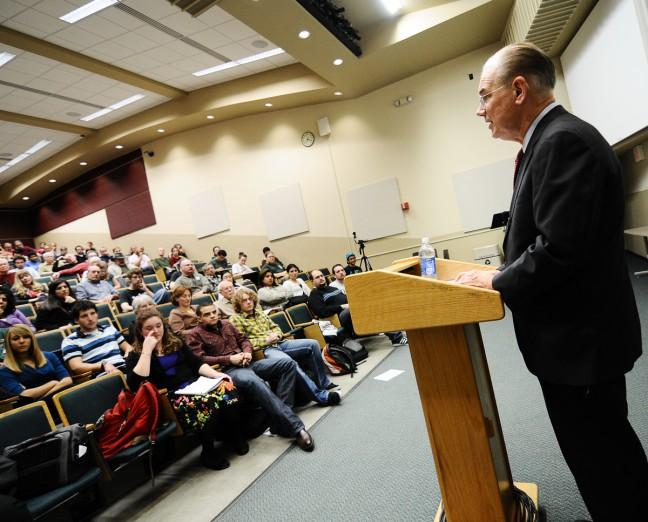Some professors struggled to get accommodations to teach classes virtually as the University of Wisconsin returned to a fall semester of mostly in-person classes.
The Wisconsin State Journal first reported three staff members with medical conditions or disabilities were denied the option to teach classes online amid the pandemic, sparking concern from University Committee, the shared governance committee that represents faculty on campus.
Some UW faculty members suspected an unwritten blanket policy was the reason why UW was not providing accommodations to vulnerable professors. Others raised concerns that their disability representatives directly told them their requests would most likely be denied, despite professors’ reasoning, according to the Wisconsin State Journal.
These concerns cumulated at the Aug. 30 University Committee meeting. At the meeting, UW Chancellor Rebecca Blank and Provost Karl Scholz denied the existence of a blanket denial policy.
“There’s never been an edict from the chancellor [or] myself,” Scholz said at the meeting. “To not approve accommodations, if nothing else, that would be grossly against the law. But it’s also the wrong thing to do.”
Scholz compared the communication between faculty and the administration about accommodation requests to a game of telephone, noting the university’s exuberant message about the return to in-person classes did not negate the administration’s “serious” commitment to reviewing accommodation requests for instruction changes.
As of the Aug. 30 committee meeting, with less than a week until classes started, 31 faculty members had submitted accommodation requests. Scholz said half of those requests were approved and one-third were still being processed.
“I have established no blanket policy here,” Blank said at the meeting. “It’s not clear to me where that statement comes from that we’ve all read in the [Wisconsin State Journal]. In part, I think people may misunderstand the fact that there are different accommodation processes.”
Blank also refuted claims about “discouraging” conversations with disability representatives where it was insinuated requests would be denied at the Aug. University Committee meeting.
Blank instead suggested some individuals may have heard about the requirements for requests to be met and decided they did not have a case.
“I guess that’s a form of discouragement,” Blank said. “It could be a form of information sharing.”
Chaim Perelman Professor of Rhetoric and Culture Michael Bernard-Donals said the process faculty members go through to be granted the ability to teach virtually is confusing and unclear.
Bernard-Donals said UW’s policy for accommodations and teaching flexibilities has two parts — one related to faculty who have a disability under the definitions provided by the Americans with Disabilities Act and another related to those who do not have a condition but nonetheless have reasons to be concerned for their health and well-being in the classroom.
“Part of the issue is that faculty and instructional staff aren’t clear on which route to follow in order to request an accommodation,” Bernard-Donals said in a written statement. “It’s also very unclear whether requests for accommodations are being turned down because the university has set a goal of 90% of classes to be taught in person, or because of health-related concerns.”
Bernard-Donals said he knows dozens of professors have gone through the process of requesting an accommodation and have been turned down after waiting up to 90 days for a decision.
“The university’s goal of teaching 90% of its courses is just that — a goal,” Bernard-Donals said. “Even if most of the requests for accommodations or flexibilities to teach online were granted, it would lower the 90-percent goal only slightly.”
Senior University Relations Specialist Greg Bump said accommodation requests from disabled instructors get reviewed individually.
Accommodations that have been made include colleagues taking over another instructor’s in-person course or a change in the course’s location to allow for more physical distancing.
“[This includes] assessing whether there is a remote work assignment they’re suited for that meets the business needs of their unit,” Bump said in a statement.
Bump said the high rates show the commitment of the broader campus to the start of a safer semester for faculty and students alike.
Currently, the vaccination rate on campus for students sits at 89% while faculty have a 92% vaccination rate according to UW’s COVID-19 dashboard.
“Members of our campus community have shown they understand the shared responsibility of making UW-Madison a safe place to work and to learn,” Bump said. “Our high vaccination rate and the masking and testing requirements provide strong protection to our community.”


